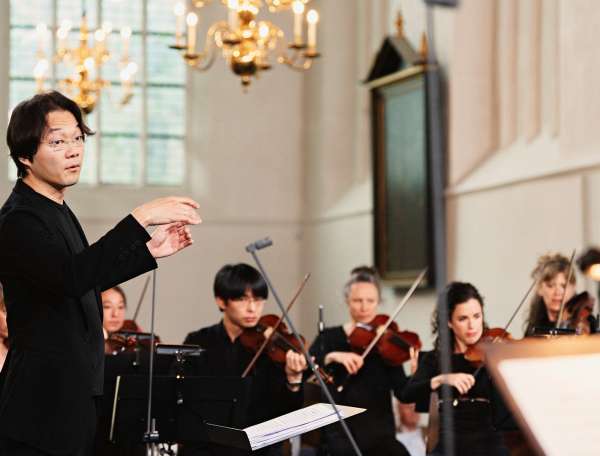

Liebster Gott, wenn werd ich sterben
BWV 483 performed by Daniel Johannsen and Matthias Havinga
Walburgiskerk, Zutphen
Behind the music
To be or not to be
Contemplating death, almost like Hamlet with the skull
‘Dearest God, when will I die?’ Sometimes we feel the need to ask this question, even when in our times life-threatening hazards are more effectively kept at bay than in any other period of human history. How different the situation was in Bach’s time. The composer had to bury ten of his twenty children, and his first wife Maria Barbara died when he was on a long journey with his sovereign Leopold von Anhalt-Köthen, so that upon his return he could do no more than visit her grave.
Death was omnipresent during the Baroque period. When Caspar Neumann, author of the poem of this Schemelli song, was born in Breslau, the Thirty Years’ War (1618-1648) had come to an end. Approximately a third of Germany’s population perished during these three decades. Neumann, not only a renowned theologian and writer but also a scientist researching demography and statistics, could have provided a long list of casualties from his own family.
Neumann’s poems and prayers remained in print for many decades, and Liebster Gott, wenn werd ich sterben? was one of the main hymns in Leipzig’s churches. Thus, Bach wrote one of his most beautiful cantatas based on it (BWV 8, in September 1724). He must have been especially fond of the beautiful melody by his older colleague and Leipzig contemporary, Daniel Vetter (also born in Breslau), since he used this tune unaltered in both the cantata and this Schemelli song from 1736.
‘Hilf, dass ich ein ehrlich Grab neben frommen Christen hab’ (Help me to have an honest grave next to pious Christians). We cannot contemplate these words without bearing in mind that Bach’s own grave on Leipzig’s Johanniskirchhof was forgotten (and definitely not well maintained) for almost two centuries, until in 1950 his remains were eventually reburied in the Thomaskirche. It is therefore only fitting that today all the musicians performing from the organ loft of the Thomaskirche look down upon this honorary grave, situated in front of the altar.
Musicalisches Gesang-Buch G.C. Schemelli
In the eighteenth century, sacred songbooks for private use were an important aid in simple, domestic devotion. For example, no fewer than 17 editions of Johann Freylinghausen’s Geistreiches Gesangbuch were published between 1704 and 1734. Two years later, pietist Georg Christian Schemmel, alias Schemelli, launched his own songbook, containing no fewer than 954 songs, 69 of which included melody, text incipit and figured bass. In order to outdo the competition, he involved probably the most famous music consultant of all time, who happened to be his son’s music teacher: Bach. Following intensive research, only three of the 21 original melodies in the collection (BWV 439-509) can be attributed with certainty to the cantor at the Thomasschule: BWV 452, 478 and 505. The others are accompaniments, revisions and improvements. Bach’s precise role in Schemelli’s Gesangbuch will probably always remain a mystery.
Extra videos
Vocal texts
Original
Liebster Gott, wenn werd ich sterben?
Meine Zeit läuft immer hin,
und des alten Adams Erben,
unter denen ich auch bin,
haben das zum Vaterteil,
daß sie eine kleine Weil
arm und elend sein auf Erden
und denn selber Erde werden.
Doch entweicht, ihr schnöden Sorgen,
soll ich nicht zu Jesu gehn?
Lieber heute noch als morgen,
denn mein Fleisch wird auferstehn.
Ich verseih es gern der Welt,
daß sie alles hier behält
und bescheide meinen Erben
einen Gott, der nicht kann sterben.
Herrscher über Tod und Leben,
mach einmal mein Ende gut,
laß mich meinen Geist aufgeben
mit recht wohlgefaßten Mut.
Hilf, daß ich ein ehrlich Grab
neben frommen Christen hab
und auch endlich in der Erde
nimmermehr zuschanden werde.
Translation
Dear Lord God, my time is flying
As in Adam’s old decree;
All earth’s children one day dying,
When will death then come for me?
This is our inheritance
One brief life our only chance
Here on earth we bear our burden,
And to that same earth returning.
So run off, you useless sorrow,
Will I not see Jesus soon?
Better yet now than tomorrow,
Then my body will rise new.
To the world all things assign;
I will leave it all behind,
My inheritance is humble:
I trust it to God immortal.
Ruler over death and living
Give to me a blessed end.
Unto you my spirit giving
Blessed peace and courage send.
May I lie in holy ground
With your people all around.
May I, once in earth I’m sleeping
Rest in peace and in your keeping.
translation © Ruth van Baak Griffioen, 2025
Credits
-
- Release date
- 17 April 2025
-
- Recording date
- 29 May 2024
-
- Location
- Walburgiskerk, Zutphen
-
- Tenor
- Daniel Johannsen
-
- Organ
- Matthias Havinga
-
- Instrument
- Henrick Bader, 1639/1643
-
- Director and editor
- Gijs Besseling
-
- Music recording
- Guido Tichelman, Pim van der Lee
-
- Music edit and mix
- Guido Tichelman
-
- Camera
- Danny Noordanus, Manon Hoskens, Remco van Leest
-
- Grip
- Wouter Visser
-
- Assistant music recording
- Marloes Biermans
-
- Producer
- Lisanne Marlou de Kok

